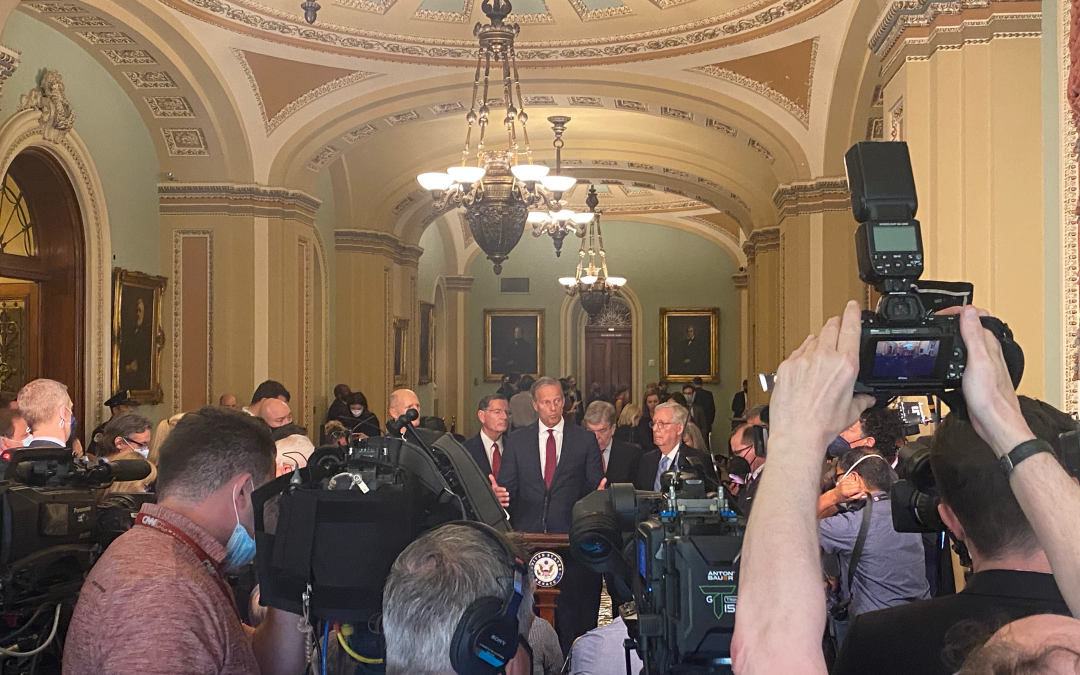WASHINGTON — Staring down a possible default on the federal debt in less than two weeks, congressional leaders Tuesday remained firm in their positions on how to raise the debt ceiling, with Senate Republicans refusing to give Democrats any avenue to address the debt ceiling outside of the budget reconciliation process.
Speaking to reporters Tuesday, Senate Majority Leader Chuck Schumer did not rule out using a reconciliation bill, although he did call the process “drawn out” and “convoluted.”
Schumer said he hopes to instead resolve the impasse with a Wednesday vote on House-approved legislation suspending the debt limit into next year. Although the maneuver does fulfill the GOP’s wishes of raising the debt ceiling with only Democratic votes, it would only succeed if no GOP senator threatened a filibuster.
“That would require getting consent from every Republican to lower the threshold (for passage) to 51 votes,” Senate Minority Leader Mitch McConnell said. “I can’t imagine that would happen.”
McConnell’s remark essentially seals the fate of Wednesday’s vote, but some experts believe that as the Treasury Department nears the debt ceiling, which would end its authority to borrow money and cause the U.S. to default on its loans, the two sides will find a solution.
The only question is whether that takes the form of 10 Senate Republicans helping to break a filibuster, which requires 60 votes to end, or Senate Democrats beginning the reconciliation process.
“A lot of these deals have gotten worked out very close to the 11th hour in the past, and there’s no reason this one can’t go the same way,” American Enterprise Institute Senior Fellow Philip Wallach said. “That will cause a whole lot of anxiety and hysterical news coverage over the next week without necessarily causing the market to freak out.”
McConnell has often said, as recently as Tuesday, that the U.S. will not default on its debts.
Schumer insists his hesitation toward using reconciliation to raise the debt ceiling is based on the lack of the time needed for such a move.
But James Wallner, a resident senior fellow at right-leaning think tank R Street, said Democrats have changed their position on reconciliation.
“[The Democrats] did start by saying they can’t do it by reconciliation, then they said they won’t do it via reconciliation, now they say they don’t have enough time to do it via reconciliation,” Wallner said.
At its most basic, reconciliation is a process laid out in the Congressional Budget Act of 1974 to allow for revisions to the federal budget by a simple majority – no filibusters are allowed. The process is required by statute to be time-consuming, with committee markups, up to 20 hours of debate on amendments and a back-and-forth with the House if changes are made in either chamber. However, certain legislative shortcuts and cooperative Republicans could allow Democrats to meet the Oct. 18 debt limit deadline even if they start the process later this week, which may be the only option left if Schumer’s planned Wednesday vote fails.
“It’s hard to say just how fast they can do things that way if they think that’s the only option,” Wallach said. “But, at the end of the day, right now they don’t think that’s the only option.”
The House bill would simply suspend the public debt limit through December 2022, But, using the reconciliation process – which is basically a budgeting process — would force Democrats to set a new, probably very large, number as the limit.
“Putting the specific number down, it’s obviously going to be a pretty dramatic number, maybe north of $30 trillion,” Wallach said. “That’s better for a (GOP) political ad than just a suspension to a certain date.”

